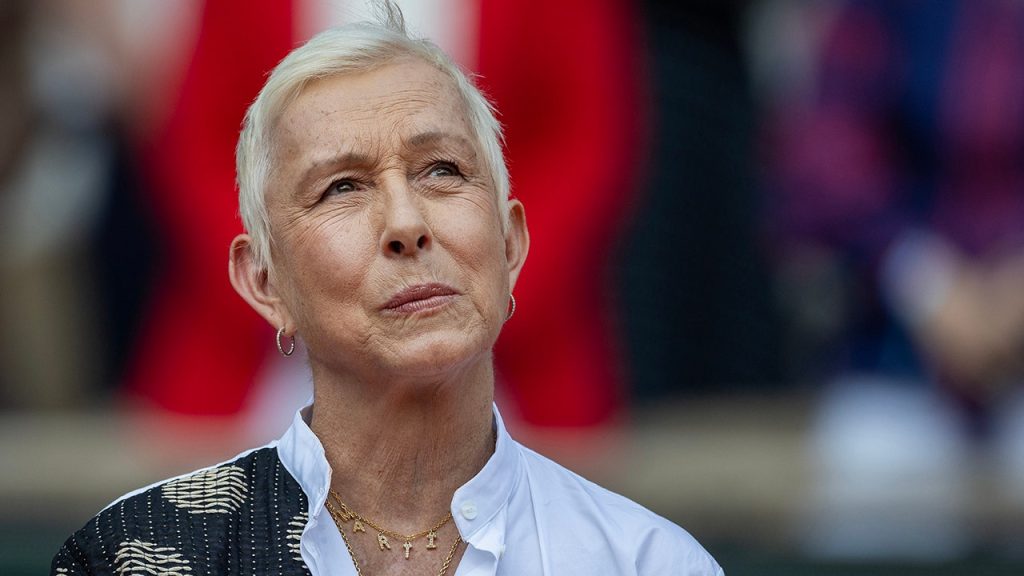Martina Navratilova, the iconic tennis legend, has been vocal about the contentious issue of transgender athletes competing in women’s sports. Recently, through a post on X, she expressed frustration that Republicans have emerged as the primary voices regarding this debate, admonishing Democrats—her own political affiliation—for their silence. Navratilova shared an image of Congresswoman Nancy Mace alongside members of Gays Against Groomers, who were promoting the slogan “Save Girls’ Sports.” She articulated her anger by declaring, “I am so mad that the Republicans captured this issue – shame on all the elected Democrats who keep silent on this!!! #whataboutthewomen.” This sentiment underscores Navratilova’s deep concerns about the implications for women’s athletics and her disappointment in the Democratic Party’s lack of engagement in advocating for women’s rights in sports.
Navratilova has not shied away from critiquing her own party for its stance on transgender rights within the realm of sports. In June, she attended the Independent Women’s Forum’s “Take Back Title IX” rally, joining a number of prominent athletes who opposed the Biden administration’s revisions to Title IX regulations. Her belief was that, initially, as members of the Democratic Party, they had attempted to ensure fair competition for transgender athletes in women’s sports. However, as she delved deeper into the complexities surrounding the issue, Navratilova concluded that creating a fair solution was unfeasible. She stated, “The more we try to find a way to mitigate the advantage… the more we figured out it’s not possible.” This realization reflects her struggle to reconcile her advocacy for inclusion with her commitment to maintaining fairness for women athletes.
As Navratilova further explored the topic, she recognized an inherent connection between women’s sex-based spaces and sports, suggesting that the two are deeply intertwined. Referencing the case of Lia Thomas, a transgender swimmer who competed on a women’s team, she highlighted the struggles many women face in the wake of changing societal norms around gender identity. Her focus shifted towards the potential impact on women’s sports, stating that her concerns are not rooted in bigotry but rather in the protection of women’s rights and opportunities within athletics. The backlash she has received for her views has been substantial, with accusations of homophobia and bigotry directed at her from within progressive circles. This reaction has led to a sense of alienation from the political group she has long identified with.
Navratilova’s criticisms extend beyond abstract discussions; she has made pointed remarks about individual athletes. For instance, she referred to Italian sprinter Valentina Petrillo, a trans woman who competed in the Paralympics, as a “pathetic cheater.” This comment emphasizes her belief that allowing transgender women to compete in women’s sports undermines fairness and equity. Her advocacy includes a continued call to “keep women’s sports female,” reinforcing her view that the integrity of women-only competitions is at stake amidst the evolving debates about gender and athletic eligibility.
The increasing polarization surrounding the topic of transgender athletes in women’s sports highlights the wider societal conflicts at play. Navratilova’s experiences echo those of many women who advocate for sex-based rights while navigating the complexities of modern gender discussions. The intersection of gender identity, politics, and sports has become a battleground where personal beliefs have profound implications on public policy and athletic integrity. Her reflections reveal a deep concern that the advances made in women’s rights in sports may be jeopardized by the push for broader inclusivity policies that do not sufficiently account for biological differences.
In conclusion, Navratilova’s public statements and activism reflect a growing tension within feminist and LGBTQ+ communities regarding the inclusion of transgender athletes in women’s sports. Her frustrations with both the Republican and Democratic parties illustrate the complexity of this issue, as it challenges long-held beliefs about identity, fairness, and equality. While championing the rights of women, she calls for a nuanced discussion around how to best include transgender athletes without compromising the principles of competitive fairness. As this debate evolves, it is clear that the voices of prominent figures like Navratilova will continue to influence the dialogue surrounding the future of women’s athletics in a changing societal landscape.

